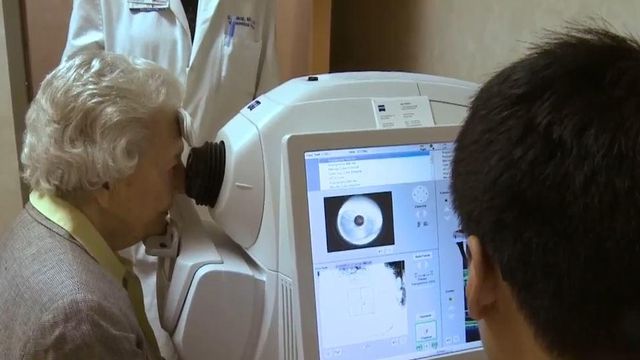Duke study suggests earliest sign of Alzheimer's could be linked to eye problems
The earliest signs of cognitive impairment that could lead to Alzheimer's Disease may be in the eyes, which is where some Duke researchers are focusing their attention.
Posted — UpdatedScott Hughes and Virginia Bailey are 96-year-old identical twins.
Growing up in Rocky Mount, the sisters couldn't have been any closer.
"Mother and Daddy had trouble telling us apart, we were so much alike," Hughes said. "We had a happy childhood. We did everything together."
Later in life, Virginia Bailey was diagnosed with Alzheimer's Disease - while sister Scott Hughes remains mentally sharp.
Their identical DNA did not lead to Alzheimer's for Hughes, but it did lead to the same eye problems, including her dystrophy - a clouding of the cornea. Both women suffer from age-related macular degeneration.
Duke ophthalmologist Dr. Sharon Fekrat treats both women. Using this imaging tool called Optical Coherence Tomography Angiography, she discovered a striking difference in the blood vessel density in different layers of their retinas.
"With very normal retinal vascular density in the superficial retinal layer in the 'cognitively intact twin," Fekrat said.
Bailey's retina revealed a marked loss of vascular density. Fekrat hopes the study of these differences may identify people at risk for developing cognitive disease.
"This might be a very quick, relatively inexpensive and reliable way to perhaps diagnose cognitive impairment before clinical symptoms," Fekrat said.
(extra space) Hughes said she is excited that she and her sister might be able to help others at risk for vision loss or brain loss.
"I still talk to her every day," Hughes said. "I hope that this leads to something that will really be productive for both diseases because both are devastating to normal life.”
The Duke study is currently an unfunded, grassroots study, but they are enrolling patients now who are diagnosed with cognitive impairment including Alzheimer's Disease.
Fekrat said she hopes the study will lead to new therapeutic interventions, including new drugs.
• Credits
Copyright 2024 by Capitol Broadcasting Company. All rights reserved. This material may not be published, broadcast, rewritten or redistributed.





